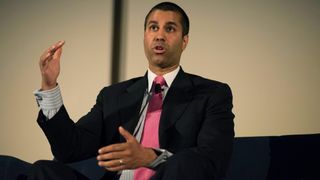Democrats introduce bill to restore net neutrality rules, but it's probably doomed
An uphill battle.

As was the plan for more than a month, Democrats in the US Senate introduced legislation to restore net neutrality rules. Should the bill go the distance—and that's a long shot at best—it would overturn the FCC's Internet Freedom Order, which passed by a 3-2 vote in December.
Led by Senator Ed Markey, a Democrat from Massachusetts, the bill leverages a legal tool called the Congressional Review Act (CRA) to effectively undo the FCC's vote. The CRA gives Congress 60 legislative days to consider and overturn rules from federal regulatory agencies with a simple majority vote. That's where things are at.
As it stands, the bill has support from all 49 Democrats and a single Republican, Senator Susan Collins of Maine, putting it one shy of the 51 votes it needs for a majority.
"Whose side are you on?" Markey yelled to a group of net neutrality supporters standing outside the Capitol. "Do you stand with the big-money corporate interests and their army of lobbyists?"
Assuming it receives the necessary 51 votes, the next step is the House of Representatives where Republicans have an even greater majority. That is where it is most likely to fall flat. But even if it did manage to pass the House, it will still need President Donald Trump to give final approval, rather than veto the measure. The latter seems much more likely, given that he appointed former Verizon lawyer Ajit Pai as FCC Chairman. After all, it was Pai who led the charge to repeal net neutrality rules in the first place.
The Internet Freedom Order is set to go into effect on April 23, barring the aforementioned legislation. Once that happens, wireless carriers and ISPs will no longer be bound by existing net neutrality rules and could implement paid fast lanes. Those who support rolling back the rules point out that the internet did not turn into a mess of fees and slowed traffic before net neutrality, and as long as consumers vote with their wallets and purses, the same should be true after April 23. The flip side to that argument is that there are many areas where consumers have only a single or two broadband providers to choose from.
Barring a surprise vote in Congress, we'll see soon enough how things ultimately play out.
The biggest gaming news, reviews and hardware deals
Keep up to date with the most important stories and the best deals, as picked by the PC Gamer team.
Paul has been playing PC games and raking his knuckles on computer hardware since the Commodore 64. He does not have any tattoos, but thinks it would be cool to get one that reads LOAD"*",8,1. In his off time, he rides motorcycles and wrestles alligators (only one of those is true).
Most Popular







